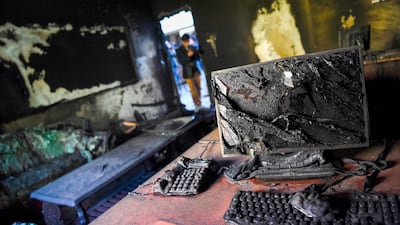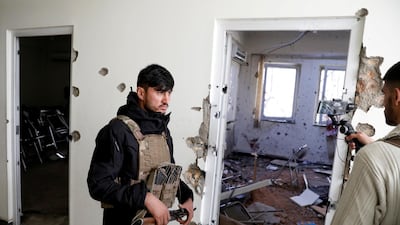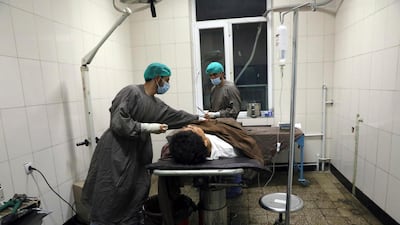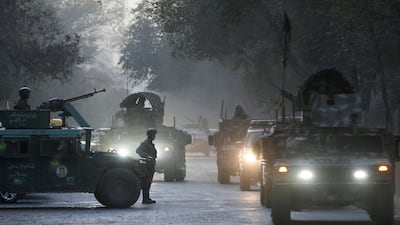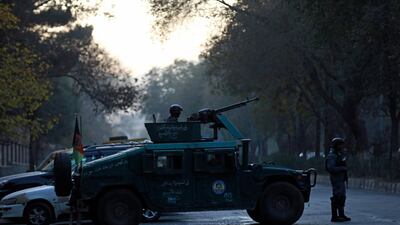With an absent gaze and left arm wrapped in blood-soaked bandages, Mubarak Etemadi says he lost most of his friends in Monday’s attack on Kabul University.
He is recovering from a deep gunshot wound to his arm and another, shallower one, to his neck in Wazir Akbar Khan hospital, miles away from the carnage that killed at least 22 and left dozens more injured.
Three men affiliated with ISIS stormed the university premises in the Afghan capital at about 11am local time, detonating a suicide bomb and spraying classrooms with bullets in a brazen hours-long assault.
“We sat in our classroom when we heard gunfire,” the law student, 22, who is in his final year, whispered quietly, exhausted.
“We were on the second floor and jumped out of the windows, but the attackers shot down on us.”
While awaiting surgery, Mr Etemadi frantically makes calls and sends messages, checking on friends to find out who was able to escape.
At times he drops the phone and dozes off, or perhaps tries to process the day’s events – a complex attack that lasted for more than six hours, while both Afghan forces and US commandos fought the three attackers.
The campus has since been cordoned off, with further clearance operations commencing under way.
Despite direct peace talks between the Afghan government and Taliban in Qatar’s capital Doha, and US preparations to withdraw its troops by next May, violence has continued to rock the country.
In the first nine months of this year alone, the UN documented 2,117 civilian deaths and injuries to 3,822 people.
Hopes for a peace settlement seem to be fading for many.
“Today is once again a dark day for Afghanistan and for our people. Every day we receive about five patients who have been injured by the war – often these are gunshot wounds or blast injuries,” said the director of Wazir Akbar Khan hospital, Dr Sayed Abdullah Ahmadi.
“It is my dream to not see such mass casualties in the future.”
Afghanistan’s government declared Tuesday to be a national day of mourning, while it reels from yet another attack on a place of learning – on October 25, another attack claimed by ISIS on a private college killed at least 30 people.
Mr Etemadi was raised on the quiet western outskirts of the Afghan capital, near the mountains, where the air is fresher and the traffic calmer.
He was focusing on studying for his law degree, and excited to be finishing his last year. But now returning to the university scares him.
Throughout the sunny autumn afternoon, sustained gunfire could be heard ringing through the university’s premises and the blasts shook the district.
Nearby, at Ali Abed hospital, Haseeb Ahmedzai, 24, a management student, lies still in a room alongside three other injured people, his right leg pierced by a bullet and now wrapped in clean bandages.
“It was a nightmare,” he said, taking a deep breath as his voice breaks. “Everything changed today. Everything changed within moments.”
He had tried to escape the attack, but was told by soldiers that leaving campus would not be safe and could cost him his life.
“They told me to wait and to stay put. Later they took me to hospital,” he said.
Outside the intensive care unit, family members of the injured gather, waiting for a glimpse of their relatives or some small assurance that they might be OK.
Jalal Ebadi, 21, a public policy student, said it was a risk leaving his house every day to study for a future government position – in Afghanistan, even daily life can become a tightrope between life and death.
On Monday, he was shot in his backside.
“We were hiding under our chairs and didn’t make a sound, but the attackers came for us. They shot many. We heard the bullets and explosions and we stayed until the special forces came for us,” he said, with his older brother and father by his side.
His family said they had prepared for the worst and were relieved to find Jalal alive.
“We were so worried,” his brother Sajat, 28, said.
“In Afghanistan, we’ve grown used to this situation. Every week, every day, attacks occur. But we were never prepared for this happen to our own family.”
Not all were so lucky. As the evening falls on Kabul, relatives of those still missing head from one hospital to the next, searching for loved ones’ names on registration lists.
Eventually and inevitably, engulfed in indescribable pain, some families make their way to the morgue, or the graveyard.
